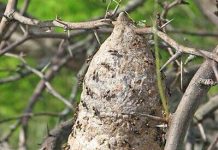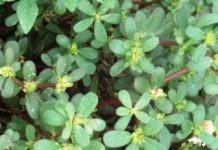Scientific name: Mangifera indica L.
Family: Anacardiaceae
Bengali/Vernacular name: Aam.
Tribal name: Tsasat, Ingsara (Mogh); Kraickci (Chak); Thakachu, Jegachu, Bochu (Garo); Thei-hai (Lushai); Ui fom (Murang); Thaihai (Pangkhoa); Sarabam, Thara-apang (Rakhaing); Sarock apaong (Marma); Amm gaith (Tanchangya).
English name: Mango.
Description of the plant: A medium to large-sized tree, with bole up to 45 m tall, crown dark green, dense and bushy. Leaves spirally arranged simple, 8-40 × 2-10 cm, narrowly elliptic to lanceolate, base acute, apex blunt, and margin often faintly wavy. Inflorescence a pyramidal panicle with male and female flowers, axillary, larger than the leaves. Flowers small, greenish-cream with reddish veins. Fruit a large fleshy drupe, variable in shape and size, yellow to red when ripe.

Plant parts used: Bark.
Medicinal uses: Decoction made from bark of the plant is used in cutting wound.
Juice extracted from bark is taken for the treatment of diarrhoea, dysentery and loose motion.
Distribution: It is cultivated throughout the country, high quality mangoes are grown in Chapai Nawabganj and Rajshahi district.
Is this plant misidentified? If yes, please tell us….















… [Trackback]
[…] Find More on that Topic: natureinfo.com.bd/mangifera-indica/ […]
This is very informative